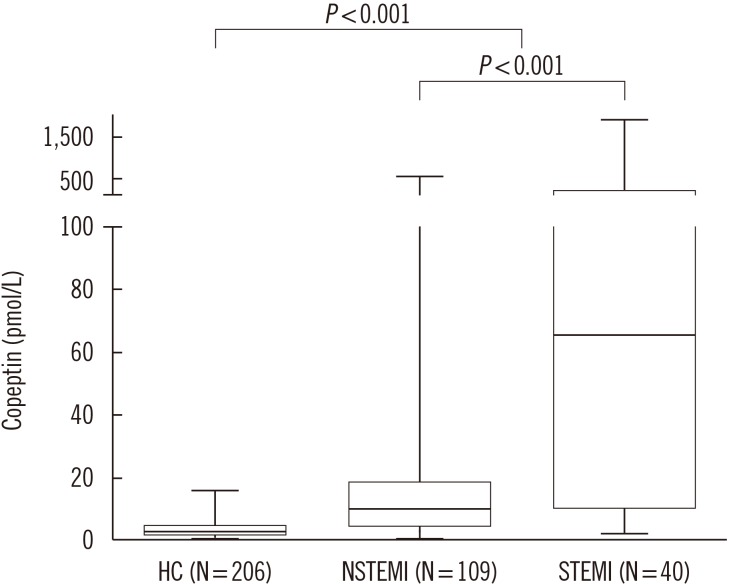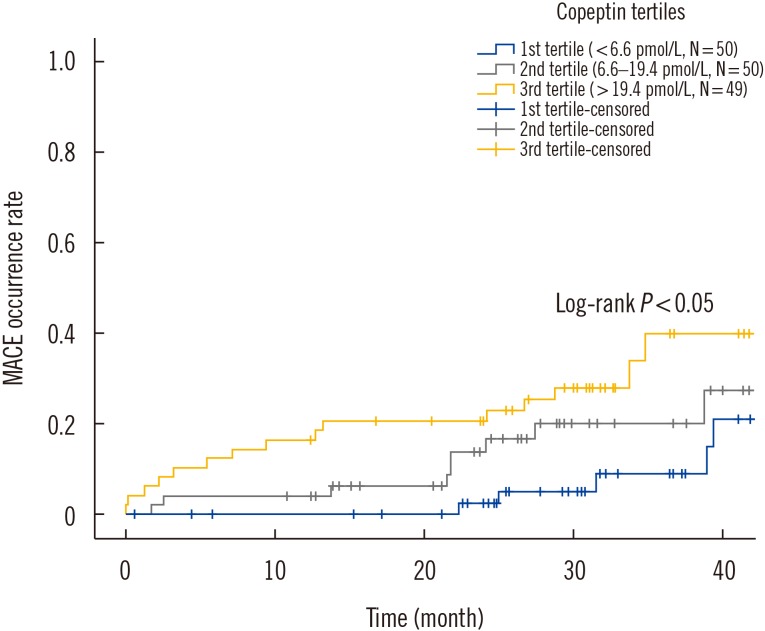Ann Lab Med.
2018 Nov;38(6):538-544. 10.3343/alm.2018.38.6.538.
Serum Copeptin Levels Predict Clinical Outcomes After Successful Percutaneous Coronary Intervention in Patients With Acute Myocardial Infarction
- Affiliations
-
- 1Departments of Laboratory Medicine, Chonnam National University Medical School and Chonnam National University Hwasun Hospital, Hwasun, Korea. mgshin@chonnam.ac.kr
- 2Department of Cardiology, Cardiovascular Center, Chonnam National University Hospital, Gwangju, Korea. cecilyk@hanmail.net
- KMID: 2429119
- DOI: http://doi.org/10.3343/alm.2018.38.6.538
Abstract
- BACKGROUND
Serum copeptin has been demonstrated to be useful in early risk stratification and prognostication of patients with acute myocardial infarction (AMI). However, the prognostic value of copeptin after percutaneous coronary intervention (PCI) for clinical outcomes remains uncertain. We investigated the prognostic role of serum copeptin levels immediately after successful PCI as a prognostic marker for major adverse cardiac events (MACE; comprising death, repeat PCI, recurrent MI, or coronary artery bypass grafting) in patients with AMI.
METHODS
A retrospective study was performed in 149 patients with AMI who successfully received PCI. Serum copeptin levels were analyzed in blood samples collected immediately after PCI. The association between copeptin levels and MACE during the follow-up period was evaluated.
RESULTS
MACE occurred in 34 (22.8%) patients during a median follow-up of 30.1 months. MACE patients had higher copeptin levels than non-MACE patients did. Multiple logistic regression analysis showed that the increase in serum copeptin levels was associated with increased MACE incidence (odds ratio=1.6, P=0.005).
CONCLUSIONS
A high level of serum copeptin measured immediately after PCI was associated with MACE in patients with AMI during long-term follow-up. Serum copeptin levels can serve as a prognostic marker in patients with AMI after successful PCI.
Keyword
MeSH Terms
Figure
Reference
-
1. Stone GW, Maehara A, Lansky AJ, de Bruyne B, Cristea E, Mintz GS, et al. A prospective natural-history study of coronary atherosclerosis. N Engl J Med. 2011; 364:226–235. PMID: 21247313.2. Zellweger MJ, Kaiser C, Jeger R, Brunner-La Rocca HP, Buser P, Bader F, et al. Coronary artery disease progression late after successful stent implantation. J Am Coll Cardiol. 2012; 59:793–799. PMID: 22361397.3. Akkerhuis KM, Alexander JH, Tardiff BE, Boersma E, Harrington RA, Lincoff AM, et al. Minor myocardial damage and prognosis: are spontaneous and percutaneous coronary intervention-related events different? Circulation. 2002; 105:554–556. PMID: 11827918.4. Ioannidis JP, Karvouni E, Katritsis DG. Mortality risk conferred by small elevations of creatine kinase-MB isoenzyme after percutaneous coronary intervention. J Am Coll Cardiol. 2003; 42:1406–1411. PMID: 14563583.5. Jang JS, Jin HY, Seo JS, Yang TH, Kim DK, Kim DS, et al. Prognostic value of creatine kinase-myocardial band isoenzyme elevation following percutaneous coronary intervention: a meta-analysis. Catheter Cardiovasc Interv. 2013; 81:959–967. PMID: 22744792.6. Bolignano D, Cabassi A, Fiaccadori E, Ghigo E, Pasquali R, Peracino A, et al. Copeptin (CTproAVP), a new tool for understanding the role of vasopressin in pathophysiology. Clin Chem Lab Med. 2014; 52:1447–1456. PMID: 24940718.7. Morgenthaler NG, Struck J, Jochberger S, Dünser MW. Copeptin: clinical use of a new biomarker. Trends Endocrinol Metab. 2008; 19:43–49. PMID: 18291667.8. Land H, Schütz G, Schmale H, Richter D. Nucleotide sequence of cloned cDNA encoding bovine arginine vasopressin-neurophysin II precursor. Nature. 1982; 295:299–303. PMID: 6276766.9. Morgenthaler NG, Struck J, Alonso C, Bergmann A. Assay for the measurement of copeptin, a stable peptide derived from the precursor of vasopressin. Clin Chem. 2006; 52:112–119. PMID: 16269513.10. Tasevska I, Enhörning S, Persson M, Nilsson PM, Melander O. Copeptin predicts coronary artery disease cardiovascular and total mortality. Heart. 2016; 102:127–132. PMID: 26661323.11. Tu WJ, Dong X, Zhao SJ, Yang DG, Chen H. Prognostic value of plasma neuroendocrine biomarkers in patients with acute ischaemic stroke. J Neuroendocrinol. 2013; 25:771–778. PMID: 23701638.12. Voors AA, von Haehling S, Anker SD, Hillege HL, Struck J, Hartmann O, et al. C-terminal provasopressin (copeptin) is a strong prognostic marker in patients with heart failure after an acute myocardial infarction: results from the OPTIMAAL study. Eur Heart J. 2009; 30:1187–1194. PMID: 19346228.13. CLSI. Procedures for the Handling and Processing of Blood Specimen for Common Laboratory Tests. 4th ed. Wayne, PA: Clinical and Laboratory Standards Institute;2010. H18-A4.14. Thygesen K, Alpert JS, Jaffe AS, Simoons ML, Chaitman BR, White HD, et al. Third universal definition of myocardial infarction. J Am Coll Cardiol. 2012; 60:1581–1598. PMID: 22958960.15. Ibanez B, James S, Agewall S, Antunes MJ, Bucciarelli-Ducci C, Bueno H, et al. 2017 ESC Guidelines for the management of acute myocardial infarction in patients presenting with ST-segment elevation: The Task Force for the management of acute myocardial infarction in patients presenting with ST-segment elevation of the European Society of Cardiology (ESC). Eur Heart J. 2018; 39:119–177. PMID: 28886621.16. Manginas A, Gatzov P, Chasikidis C, Voudris V, Pavlides G, Cokkinos DV. Estimation of coronary flow reserve using the Thrombolysis In Myocardial Infarction (TIMI) frame count method. Am J Cardiol. 1999; 83:1562–1565. PMID: 10363873.17. Myler RK, Shaw RE, Stertzer SH, Hecht HS, Ryan C, Rosenblum J, et al. Lesion morphology and coronary angioplasty: current experience and analysis. J Am Coll Cardiol. 1992; 19:1641–1652. PMID: 1593061.18. Cutlip DE, Windecker S, Mehran R, Boam A, Cohen DJ, van Es GA, et al. Clinical end points in coronary stent trials: a case for standardized definitions. Circulation. 2007; 115:2344–2351. PMID: 17470709.19. Reichlin T, Hochholzer W, Stelzig C, Laule K, Freidank H, Morgenthaler NG, et al. Incremental value of copeptin for rapid rule out of acute myocardial infarction. J Am Coll Cardiol. 2009; 54:60–68. PMID: 19555842.20. Slagman A, Searle J, Müller C, Möckel M. Temporal release pattern of copeptin and troponin T in patients with suspected acute coronary syndrome and spontaneous acute myocardial infarction. Clin Chem. 2015; 61:1273–1282. PMID: 26341999.21. von Haehling S, Papassotiriou J, Morgenthaler NG, Hartmann O, Doehner W, Stellos K, et al. Copeptin as a prognostic factor for major adverse cardiovascular events in patients with coronary artery disease. Int J Cardiol. 2012; 162:27–32. PMID: 22284271.22. Khan SQ, Dhillon OS, O'Brien RJ, Struck J, Quinn PA, Morgenthaler NG, et al. C-terminal provasopressin (copeptin) as a novel and prognostic marker in acute myocardial infarction: Leicester Acute Myocardial Infarction Peptide (LAMP) study. Circulation. 2007; 115:2103–2110. PMID: 17420344.23. Kelly D, Squire IB, Khan SQ, Quinn P, Struck J, Morgenthaler NG, et al. C-terminal provasopressin (copeptin) is associated with left ventricular dysfunction, remodeling, and clinical heart failure in survivors of myocardial infarction. J Card Fail. 2008; 14:739–745. PMID: 18995178.24. Katan M, Nigro N, Fluri F, Schuetz P, Morgenthaler NG, Jax F, et al. Stress hormones predict cerebrovascular re-events after transient ischemic attacks. Neurology. 2011; 76:563–566. PMID: 21228295.25. Katan M, Fluri F, Morgenthaler NG, Schuetz P, Zweifel C, Bingisser R, et al. Copeptin: a novel, independent prognostic marker in patients with ischemic stroke. Ann Neurol. 2009; 66:799–808. PMID: 20035506.26. Jarai R, Mahla E, Perkmann T, Jarai R, Archan S, Tentzeris I, et al. Usefulness of pre-operative copeptin concentrations to predict post-operative outcome after major vascular surgery. Am J Cardiol. 2011; 108:1188–1195. PMID: 21798504.27. Geri G, Dumas F, Chenevier-Gobeaux C, Bouglé A, Daviaud F, Morichau-Beauchant T, et al. Is copeptin level associated with 1-year mortality after out-of-hospital cardiac arrest? Insights from the Paris registry*. Crit Care Med. 2015; 43:422–429. PMID: 25599466.28. Ibáñez B, Heusch G, Ovize M, Van de Werf F. Evolving therapies for myocardial ischemia/reperfusion injury. J Am Coll Cardiol. 2015; 65:1454–1471. PMID: 25857912.29. McMurray JJ. Clinical practice. Systolic heart failure. N Engl J Med. 2010; 362:228–238. PMID: 20089973.
- Full Text Links
- Actions
-
Cited
- CITED
-
- Close
- Share
- Similar articles
-
- No-Reflow Phoenomenon by Intracoronary Thrombus in Acute Myocardial Infarction
- Acute myocardial infarction in young patient probably due to Kawasaki disease
- Successful Primary Percutaneous Coronary Intervention without Stenting: Insight from Optimal Coherence Tomography
- Cardiac arrest due to an unexpected acute myocardial infarction during head and neck surgery: A case report
- Clinical outcome in elderly patients older than 70 years with acute myocardial infarction after use of platelet glycoprotein IIb/IIIa receptor blocker during percutaneous coronary intervention: Comparison with those younger than 70 years



